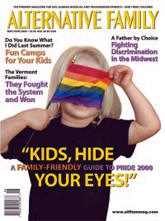 |


Biological, Nuclear Family isn't the Only Parental Model Is Called Good News for Non-Traditional GLBT Families |
|
Compiled By GayToday
The Troxel v. Granville case involved grandparents who sought court-ordered visitation against the wishes of their former daughter-in-law, the children's mother. Though Justice O'Connor's decision struck down this particular law because it was "breathtakingly broad," the Court stopped short of ruling that all non-parent visitation statutes are unconstitutional. "Monday's ruling is good news for gay, lesbian, bisexual and transgender families," said Paula Ettelbrick, Family Policy Director of the NGLTF Policy Institute. "We're pleased that the Supreme Court's decision tells state lawmakers and judges that diverse family structures may be legally recognized in certain contexts. The Court seems to have left the door open for state lawmakers and judges to define a child's family as having two moms or two dads."
National gay, lesbian, bisexual and transender groups argued that the Washington law was too broad, but nonetheless prevailed upon the Court to leave the door open for state lawmakers to continue to craft rules and guidelines to recognize the diversity of family and parental relationships that currently exist in our society. "In acknowledging the changing nature of families nationwide, the court has also recognized the need to limit third-party interference in family decisions," said Michael Adams, Associate Director of the ACLU Lesbian and Gay Rights Project. "The court has done this in a way that will protect the rights of parents without clinging to outdated notions of what constitutes a family." Lambda Legal and Defense Fund Director Beatrice Dohrn said, "We are… heartened that the Court adopted a respectful tone about the many kinds of families who raise children well. The decision leaves legal room for adults, like lesbian and gay parents without biological or legal ties to children, to play a role in their children's upbringing." |

 Washington, D.C.--In a case that could have ramifications for same-sex families,
the United States Supreme Court struck down a Washington state law Monday that
could have given any person the right to seek court-ordered visitation against
parents' wishes.
Washington, D.C.--In a case that could have ramifications for same-sex families,
the United States Supreme Court struck down a Washington state law Monday that
could have given any person the right to seek court-ordered visitation against
parents' wishes.
